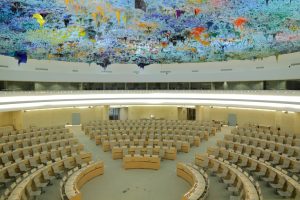Thailand is currently bidding for the third time for a seat on the United Nations Human Rights Council (UNHRC), with the election for a three-year term for 2025-2027 being held at the U.N. headquarters in New York in October. Like many countries with poor records on human rights, Thailand’s bid will come with a high level of scrutiny and international criticism.
In 2023, Freedom House, a democracy barometer, noted that only 30 percent of the countries serving on the Council were “free,” as classified by its Freedom in the World annual report. The vast majority of members, 70 percent, were classified as “partly free” or “not free.” Thailand, with a revised ranking, would join the latter category if elected in October. Human rights-abusing members of the UNHRC are rarely called out for their behavior, with Russia being an outlier after being removed following its invasion of Ukraine.
For Thailand, the most pressing questions are why and why now? The second attempt at a seat on the Council failed as a result of diplomatic fallout from the 2014 coup and the subsequent increase in human rights violations, including misuse of the Criminal Code and the lese-majeste law as a weapon against the political opposition. Other than Thailand’s return to a semi-democratic political environment since last year’s election, scarcely little has changed since.
The human rights landscape is the same. At the height of political protests in 2020 and 2021, the number of lese-majeste cases increased exponentially, with Thai Lawyers for Human Rights (TLHR) reporting that between July 2020 and February 2023, 1,895 people have been charged or face prosecution due to political participation and almost 1,900 people facing prosecution in nearly 1,200 cases by February 2023, with 211 cases involving children and youth under 18 years old. 253 cases were under Article 112 or lese-majeste.
In January, a man was sentenced to a record 50 years in prison for insulting the monarchy on social media. Another man was jailed for selling rubber duck calendars that had some dressed in royal regalia. Weighted against a host of other human rights issues, lese-majeste cases might even pale in comparison. Thailand isn’t a party to the International Convention for the Protection of All Persons from Enforced Disappearance, while 77 out of 93 cases of forced disappearances between 1980 and August 2023 remain unresolved.
Prime Minister Srettha Thavisin has not breathed a word about ratification of the International Convention on the Protection of the Rights of All Migrant Workers and Members of Their Families, even though as many as 5 million migrant workers from neighboring Myanmar, Cambodia, and Laos actively seek work in Thailand. The potential reversal of changes to Thailand’s Fisheries Act could undo labor protections for workers who have been the subject of cruel treatment on Thai fishing vessels.
The truth about Thailand’s new UNHRC bid is that the effort is simply about repairing its international image. Srettha’s Pheu Thai government sees the opportunity to frame the semi-democratic present as representing a “new page” in democracy and respect for human rights, suggesting that it can lead in areas of gender equality and peacekeeping. While the Thai government would like to pad its record by crediting its COVID-19 strategy with protecting the health of migrant workers, during the fourth wave of pandemic cases in 2021, the most vulnerable groups in the country were disproportionately affected economically and were the slowest to recover. Socio-economic issues, which are also human rights issues, continue to plague Thailand, and notable critics of Thailand’s pandemic response were repeatedly targeted by the previous government.
Thailand is likely banking on the support of its neighbors, especially Vietnam, which currently holds a seat, and low competition among member states. When Saudi Arabia was unsuccessful in its 2020 bid, only 90 states voted in favor of Riyadh’s candidacy. China, also a current member, was elected due to a successful behind-the-scenes campaign as well as an ongoing diplomatic effort to win over support from member states to support its positions on other human rights issues. Thailand’s chances of winning one of the 13 Asia-Pacific seats also depend on the number of competitors; the lower the better, from Bangkok’s perspective.
If Thailand’s bid was not merely about its external image, there might be tangible evidence of a sea change in how it responds internally and externally to criticisms of its human rights record. A clear example of this would be the politicization and a return to transparency in the selection of the members of the National Human Rights Commission of Thailand, which was downgraded to “B” status by the Global Alliance of National Human Rights Institutions in November 2015. While lese-majeste is off the table for Srettha, Thailand would also be making considerable progress in addressing the most prominent concerns of U.N. Member States during its 2021 Universal Periodic Review, namely its badly misused Computer Crimes Act and related acts of “lawfare.”
Juxtaposed with the grim realities on the ground, Srettha’s bid to rebrand the Kingdom as a human rights champion is not only contradictory, but ill-timed. Unfortunately, given the prior successes of China and Vietnam, there’s more than a chance this less-than-honest campaign will succeed.

































